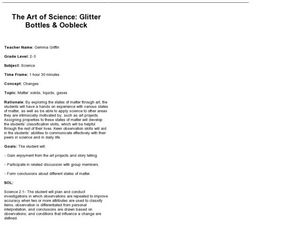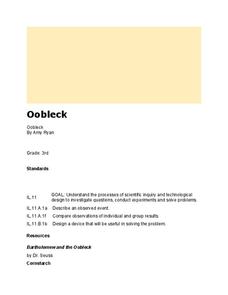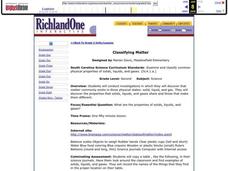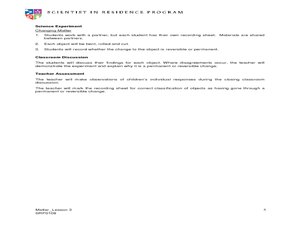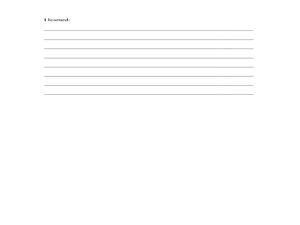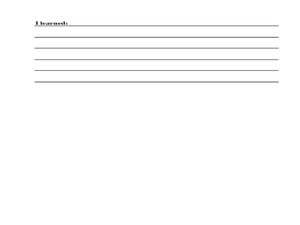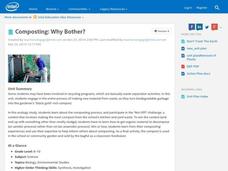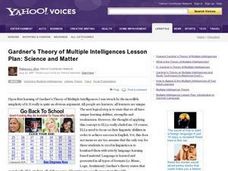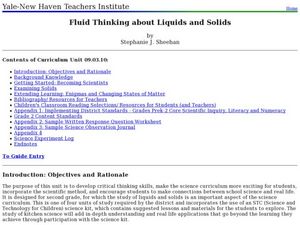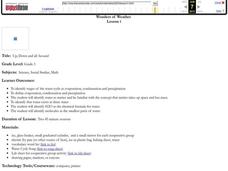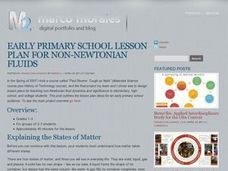Curated OER
The Three States of Matter
Students explore the three states of matter. In this physics lesson, students are shown examples of solids, liquids, and gases. Students make cookies and identify the three states of matter during the baking process.
Curated OER
Three Regions of North Carolina
Fourth graders investigate the three regions of North Carolina using works of art.
Curated OER
States of Matter Lesson
Second graders identify the three phases of matter and demonstrate how a property can change states of matter. In this states of matter lesson, 2nd graders make an Ooze to discover how a solid changes into a liquid. Students...
Curated OER
The Art of Science: Glitter Bottles and Oobleck
After having a class discussion on the three states of matter, young scientists utilize the wonderful substance, Oobleck in order to experience something that changes states of matter. They also create "sparkle jars" which...
Curated OER
Oobleck
Students explore "matter." In this literacy and three states of matter activity, students listen to Bartholomew and the Oobleck by Dr. Seuss, then work in groups to explore "oobleck" (cornstarch and water mixture) with their five senses....
Curated OER
The Three Rock Groups
Firts graders distinguish between sedimentary, igneous, and metamorphic rocks. They group the rocks into the appropriate group. This is one of the best-organized plans I've seen! Learners watch a PowerPoint presentation which is embedded...
Curated OER
Classifying Matter
Second graders conduct investigations to explore matter. In this states of matter instructional activity, 2nd graders complete four activities to analyze the three states of matter. Students analyze the properties of solids, liquids, and...
Curated OER
What's The Scoop?
Students explore the properties of matter. In this cross curriculum three states of matter science lesson, students listen to the poem "Eighteen Flavors" by Shel Silverstein, and predict what will happen if listed ingredients are...
Curated OER
Physical Changes to Matter
Pupils explore matter by conducting an in-class experiment. They experiment with water's various forms by melting and freezing water, identifying its new shape. These observations are recorded to supplement later discussion. They also...
Curated OER
What's the Matter?
Students explore matter. In this matter and technology lesson, students locate examples of solids, liquids, and gases inside and outside the classroom, and record their findings in a graphic organizer. Students listen to the...
Curated OER
Heat and Matter
Students explore liquids and solids by conducting in class experiments. In this matter lesson, students define the properties of matter and how heat can change those properties. Students experiment with heating objects such as butter and...
Curated OER
State Change
Eighth graders explore the physical change of matter. As a class, they discuss their favorite super hero and determine if the hero undergoes a physical or chemical change. Students examine the change of state and phase change. In groups,...
Curated OER
Changing States of Matter - Making Ice Cream
Students make ice cream as a result of viewing changes of states of matter. In this matter lesson plan, students learn how heating and cooling can effect a state of matter to change.
Curated OER
Chemical Wonders
Students read about and discuss how chemical engineers use different states of matter to create substances. In this chemical engineering lesson plan, students also give examples of the 3 kinds of matter.
Intel
Composting: Why Bother?
The first STEM lesson in a group of 10 explores composting. After discussing how to make a better tomorrow, classes are challenged to track garbage in their communities, visit a local waste management facility, and conduct a survey...
Curated OER
Science and Matter: Multiple Intelligences
Students complete presentations of their understanding of the concept of matter in many different forms. In this matter lesson plan, students use whatever multiple intelligence they feel strongest in to present their presentation.
Curated OER
Matter: Build a Word
Fourth graders examine matter and the periodic table of elements. In this matter lesson, 4th graders discuss atoms and their composition. Students explore the periodic table of elements and use it to spell words out of the elements.
Curated OER
Kinds of Weather and What to Wear
Students explore how temperature and wind contribute to types of weather. In this weather lesson plan, students observe an experiment in which ice, steam, and an electric fan are manipulated to produce results that simulate how fog and...
Curated OER
The Water Cycle: States of Water
Elementary schoolers explore states of matter by concentrating on the ways in which water moves between its solid, liquid, and gaseous states in a variety of Earth environments. Learners interpret these movements through dance. The...
Curated OER
Fluid Thinking About Liquids and Solids
Second graders examine the physical characteristics of the different states of matter. In this chemistry lesson plan, 2nd graders observe how matter changes from one phase to another. They classify substances according to its type of...
Curated OER
Mixing It Up!
Third graders identify the different states of matter. In this science lesson, 3rd graders describe the different components of solutions and mixtures. They create emulsions, foams and suspensions in the lab.
Curated OER
Wonders of Weather
Fourth graders complete activities to study weather and the water cycle. In this water cycle activity, 4th graders observe a demonstration of the three stages of water. Students work in groups to complete a water cycle lab activity....
Curated OER
Non-Newtonian Fluids
Students will use water, cornstarch, eggs, and more to explore the different states of matter. They will make observations of an unknown substance called "Oobleck" and test its liquid and solid properties. This would be a great...
Curated OER
Water and Ice
Students investigate how water changes state. In this water lesson, students observe, measure, and describe water as it changes state. This lesson includes extensions which can be accessed via the provided web links.



